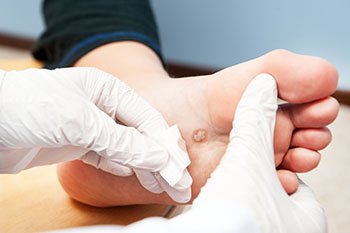 Plantar warts are benign skin growths that occur on the soles of the feet due to a human papillomavirus (HPV) infection. HPV can get into the feet through a tiny crack in the skin and make the top layer of skin grow rapidly, thereby creating a wart. Warts on the bottom of the feet may be asymptomatic, or they may cause pain or discomfort while standing or walking due to pressure on the bottom of the foot. Plantar warts can typically be diagnosed through a physical examination and can be treated through medications, cryotherapy, or surgical removal. If you have plantar warts, consult with a podiatrist to find the right treatment for you.
Plantar warts are benign skin growths that occur on the soles of the feet due to a human papillomavirus (HPV) infection. HPV can get into the feet through a tiny crack in the skin and make the top layer of skin grow rapidly, thereby creating a wart. Warts on the bottom of the feet may be asymptomatic, or they may cause pain or discomfort while standing or walking due to pressure on the bottom of the foot. Plantar warts can typically be diagnosed through a physical examination and can be treated through medications, cryotherapy, or surgical removal. If you have plantar warts, consult with a podiatrist to find the right treatment for you.
Plantar warts can be very uncomfortable. If you need your feet checked, contact Bruce Smit, DPM from Frankfort Foot & Ankle Clinic. Our doctor will assist you with all of your foot and ankle needs.
About Plantar Warts
Plantar warts are the result of HPV, or human papillomavirus, getting into open wounds on the feet. They are mostly found on the heels or balls of the feet.
While plantar warts are generally harmless, those experiencing excessive pain or those suffering from diabetes or a compromised immune system require immediate medical care. Plantar warts are easily diagnosed, usually through scraping off a bit of rough skin or by getting a biopsy.
Symptoms
Treatment
To help prevent developing plantar warts, avoid walking barefoot over abrasive surfaces that can cause cuts or wounds for HPV to get into. Avoiding direct contact with other warts, as well as not picking or rubbing existing warts, can help prevent the further spread of plantar warts. However, if you think you have developed plantar warts, speak to your podiatrist. He or she can diagnose the warts on your feet and recommend the appropriate treatment options.
If you have any questions please feel free to contact our office located in Frankfort, IL . We offer the newest diagnostic and treatment technologies for all your foot and ankle needs.